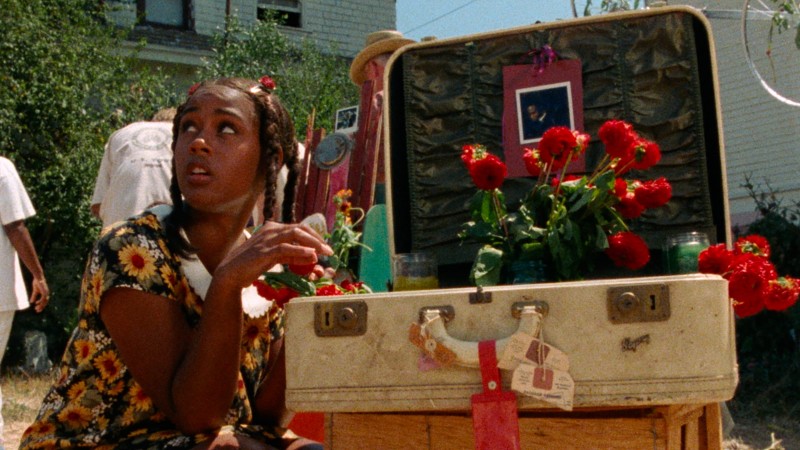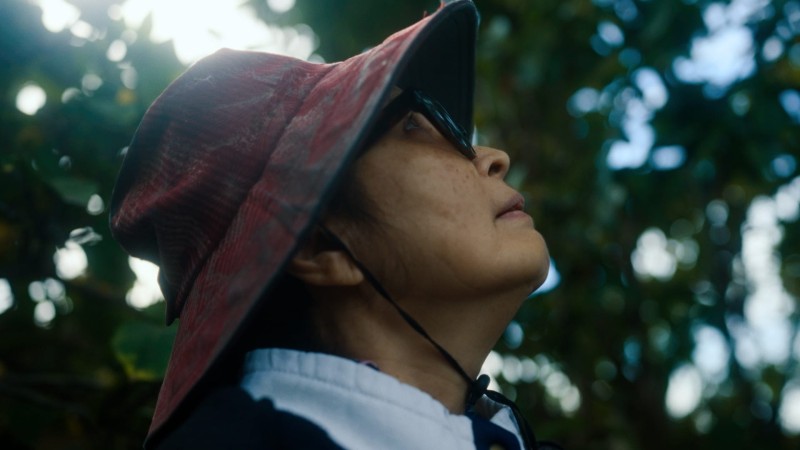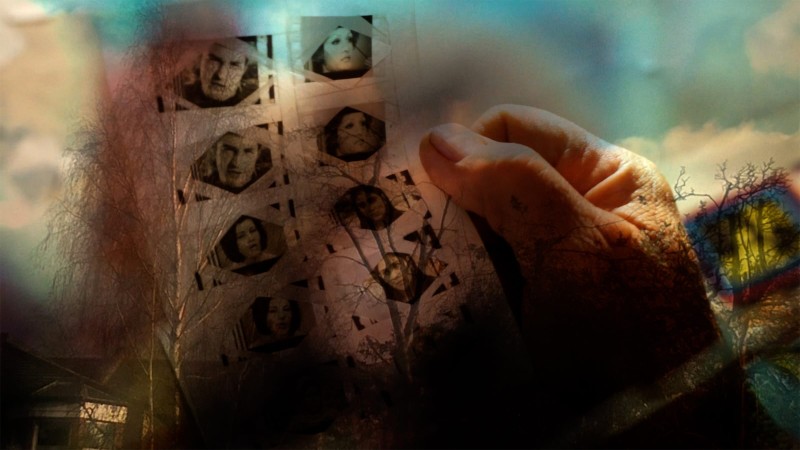Talking Greek Cinema with Yorgos Lanthimos and Ariane Labed

We were delighted when Greek director Yorgos Lanthimos and his wife, the actress Ariane Labed, dropped by for lunch in the Criterion kitchen on Monday, the day after the New York Film Festival premiere of Yorgos’s new film, The Lobster. In this absurdist, black-comic modern fable, which Yorgos dreamed up with cowriter Efthymis Filippou, Ariane does a star turn in a supporting role as the chambermaid in a hotel where people arrested for being single are taken and given forty-five days to find a mate from among the other “guests.” If they fail, they will be turned into the animals of their choice and set free.
As his English-language debut and first time working with Hollywood actors, The Lobster marks the beginning of a new chapter for Yorgos, whose previous films (My Best Friend, Kinetta, the Academy Award–nominated Dogtooth, and Alps) were each made in Greece on an extremely modest budget with a crew made up of Yorgos’s friends. “Things are going to be different from now on,” someone says shortly after Yorgos arrives, and though he seems to know it’s true, Yorgos says, “Do you think so? I don't know.”
Yorgos and Ariane have an easy, down-to-earth rapport, and though they won't make any claims for their cinephilia, it's clear that they are both passionate about movies. In the time it takes to get from the front door to the kitchen, the conversation has touched on Marco Ferreri's Dillinger Is Dead (“We just watched this!” Yorgos says), Jean-Luc Godard's Vivre sa vie, and the film posters of legendary German designer Hans Hillmann, a graphical touchstone for Yorgos, whose poster for The Lobster owes a debt to Hillmann's style. As we sit down to a simple lunch of salad and homemade sandwiches, it doesn’t take long for Yorgos to introduce us to a film none of us have seen.
Who are the Greek filmmakers you look up to?
Yorgos: Do you know Nikos Papatakis? You have to watch this film called The Shepherds of Calamity. It’s just the most amazing—not only Greek film. It’s brilliant. It’s black and white. I can’t describe it. It takes place in this village and it’s a bit bucolic, but so absurd and modern at the same time. You couldn’t believe that this film was made in Greece back in the sixties.
Is he still alive?
Yorgos: He died a few years ago. He only made a few films, and he produced the Jean Genet short, Un chant d’amour, and I think Shadows for Cassavetes. You know Nico, the singer? That’s taken from his name, Nikos Papatakis. He’s a great figure. He lived in France. He’s quite a case.
Would you say that he was an influence on you, or do you just like his films?
Yorgos: No, I just love them. Actually I was trying to find Olga Karlatos, who’s in this film and was his wife at the time, to be the mother in Dogtooth, but we never found her. She did a couple of films in Italy, a couple exploitation films, but then she retired. We couldn’t figure out where she was, and only recently I discovered that she just became a barrister in Bermuda or somewhere. You should see this film.
So Ariane, how does a French actress find herself working in Greek films?
Ariane: I have a theater group that I created when I was starting out, and the director, she’s Greek. So I went there for a project for nine months, and I stayed three years. But I’ve had a connection with this country for a long time because my parents, who are both French, are in love with Greece, and I was born in Greece. I met Yorgos in Greece, and we lived together there for three years, and I learned Greek with him.
So in all the time that you were making The Lobster, a film that pits couples against single people, you were a couple.
Yorgos: Yeah, but my cowriter is single, so there was a balance.
Does he feel ostracized because he’s single? Does he feel left out in the world?
Yorgos: I think he does.
Has this film done anything to rectify the situation for him?
Yorgos: No, not really. I don’t think he wants the situation rectified. He’s a loner. I’m the romantic and he’s a loner.
So who’s the rule maker? Your films always seem to have some elaborate set of mysterious rules underlying them.
Yorgos: I think it’s both of us.
Ariane: It’s a game that you have, I think.
Yorgos: First we have the initial idea, which could be anything. And because we don’t want to just do something realistic, we try to come up with this quite particular situation or condition, so that we can push things and see what happens.
It’s like a laboratory—
Yorgos: A laboratory where you put things and see how they react under extreme conditions and what they reveal.
Ariane, are you involved in the script part or do you read it when it’s done?
Ariane: I try never to talk about that—my role.
Yorgos: She reads it early on, or I read it to her if it’s in Greek.
You write in Greek and then translate into English?
Yorgos: We write the first draft in Greek and then translate it, and we work with a friend of ours who’s half-British, half-Greek, and he’s done subtitles for our previous films and is familiar with our tone. Then we work in English after the first draft, and he corrects things for the tone if necessary. It’s good for me to read it aloud. I understand more when I read the screenplay to someone.
Ariane, is your role decided at that point?
Ariane: No. I wasn’t at all sure that I would be in The Lobster, actually.
Yorgos: You asked for the role of the maid, though.
Ariane: I asked for all the parts.

What is your casting process like?
Yorgos: It’s very instinctive.
So, do people audition for you? How did you hook up with Rachel Weisz and Colin Farrell?
Yorgos: Well, those kinds of actors don’t really audition. Now that I meet them, I think that it’s mostly created by agents and managers, that kind of difficulty communicating with them. I don’t understand why it’s humiliating for an actor of that level to audition, but auditions are not about whether or not you’re a good actor, they’re about how we’ll work together. Maybe we’ll hate each other, or the way I work won’t suit you. Why wait until you start a twenty-million-dollar film, only to find out on the first day of filming that you cannot work together?
Rachel sought me out long ago. She’d seen Dogtooth at the time. We’d just met, I knew her work, and she said, “I’d like to do something with you.” So when I finished the script, I gave it to her. Colin I always liked. Even in films that I didn’t like, I thought he was great. There’s something about his presence that I’ve always liked. He’s a wonderful person as well, and so amazing and smart and funny.
Do you allow the actors to bring themselves and whatever else they want to the role?
Yorgos: I’m quite open, because even in the screenplays we don’t really describe the characters. Maybe their age if it’s important, but if it’s not we leave it as open as possible. I just think about the people that I’d like to work with, and whether they fit those roles and those characters. Something that’s very important for me—which is difficult for casting directors or producers—is that I need to cast one role at a time. I can’t cast the female and male lead at the same time, because the chemistry and the balance between them is very important. If one of them says yes and the other says no, then I just can’t be sure about the other choices. So that’s a bit of a longer process and annoys casting directors, because they want to have this brief of what the character is like, and I go, “It can be from Colin Farrell to . . . I don’t know.” I might like Colin Farrell, but I might not like someone you think is similar to Colin Farrell. It’s not about being like Colin Farrell. It’s the actual person I like.
In Notes on the Cinematographer, Bresson talked about this idea of actors as models.
Yorgos: I read that book every time I make a film.
Ariane: It’s his favorite, I think.
Yorgos: I was sending Colin a text with one of Bresson’s quotes every day, just before we went to bed.
Terrence Malick asked us to send Javier Bardem Diary of a Country Priest to help him prepare for a role, so there’s a lot of Bresson being sent around. Do you think casting directors understand that idea, like when you say you’re looking for a model and not an actor?
Ariane: That might be one of your rules—you don’t want actors to act.
Yorgos: Everyone acts.
All your films up to now were made in Greece on very small budgets. This is your first movie in English, and it’s going to make an impression. Things are going to change for you from here.
In Greece we didn’t have any money, and we just did it with friends. It was just, “Okay we finished it, so let’s go and do it,” and it didn’t depend on anyone or anything else. Now it costs more, there are all these parties that might fall away—so we need to have a couple of things going on, so if one falls apart we’ll have something different to work on.
Would you ever step back from bigger budgets and just go make a movie on a shoestring again?
Yorgos: If it’s something I wanted to do and couldn’t find any other way of doing it, and it could be done, definitely, why not? But I want to be able to progress and make a few choices about the stuff that I’m doing. Because before it was like, “What stuff do you have? What clothes do you have? Do you have a couch that we can use? How’s your house? And, oh, we need a car—who has a car?” It was really that kind of situation, so to be able to say, “I want a black car” is like, wow.
So this was the first film you’ve done that had a big budget? Does that change how you approach it?
Yorgos: Yeah, I made choices! But still, it’s really small, and the choices were like, “Do you want these pants that cost twenty euros? Or these that cost ten euros . . . We’re over budget.” And I go, “Okay, it’s not a huge difference, let’s take the ten-euro pants.” It’s funny, because if you actually look at it in absolute numbers, The Lobster is bigger than my other films were, but there’s an added value to those other films because they had people working on them who were very experienced and very competent and didn’t get paid. So that added value is nowhere to be seen. In The Lobster we paid everyone, and for the first time we paid ourselves as well. So it just became much bigger.
Lots of people’s first films end up being their most interesting work because they have limitations that force them to make creative choices.
Yorgos: I pose limitations as well, because, for instance, there are things that I liked when we were making these films. I was saying, “We’re not using any lights,” out of necessity, but also because we grew to like that. We move fast, and we can concentrate on the actors and the scene. I don’t like people moving lights around, and going, “Okay, let’s wait to set up the lights.” So I went to a budget where we could have had lights, and we said—
You don’t use lights?
Yorgos: No. Well there’s a couple of night scenes where we had to, where we used a couple of lights, but generally, no, we didn’t. It’s a rule we imposed on ourselves, that we’re not using any lights.
So it’s all practical lighting...
Yorgos: Yeah, it’s a rule in filmmaking.
What are some others?
Yorgos: We didn’t use any makeup either—unless the character wears makeup. Those kind of things came from a background of making films where we couldn’t afford to have makeup or lights. But they’re things we like, and they helped us create a language and a taste, so we tried to follow these. And it’s not like because we have money, we go, “Okay, let’s switch on some lights here.” We grew to dislike having lights. If it’s necessary, we do it—if we think it’s better for the film.
And the way we’re editing, we’re trying to take our time. I don’t like watching stuff. I don’t reshoot a lot of stuff, because I haven’t watched a lot of what we’ve shot.
You don’t look at dailies?
Yorgos: I do a little bit. I try not to, or I’ll look at dailies, but I never look at what my editor has edited. I don’t like to see the film put together slowly—I like to let him put it together in one go and be shocked.
Have you been working with the same editor all along?
Yorgos: All of my films have been edited by him. He’s the master. We call him “The Teacher.” He’s quite a character, but he’s done everything from older films to commercial films. He’s done everything. He’s very experienced, but we get along really well. He’s obsessed. He never leaves the room. He’s just editing all day. With The Lobster we actually went to a Greek island to edit it.
Ariane: It was great . . .
Yorgos: It sounds a bit lazy, but it wasn’t. We were there, and friends of ours had two houses next to each other—they were cousins—so they gave us their houses. The editor, Yorgos Mavropsaridis—we also call him “Black Fish” because Mavropsaridis means black fish—he was in one house, and I was in the next one, and we spent two months there. He was editing all the time, and he would go out at 7:00 p.m. for a swim, and then he would go back in and work until midnight or whatever. So we would bring him food, and he would eat something, but he never left the room. He was obsessed.
Ariane: You are the same.
Yorgos: No, we were going for lunch and for a swim. We would find him in the room and bring him some food. But it was very concentrated. It sounds like, “Oh, we were on an island not working too much,” but because you don’t have any other distractions, you don’t meet other people, you don’t have meetings, you don’t have errands to do, you’re just there with the editing. You can go for a swim—which is pleasant—then go somewhere nice to eat, but then you’re working. So it’s very concentrated work. I think I’m going to be doing that for the next ones as well. And the thing is, after two months we felt kind of guilty, so we went back to London and rented a place in Covent Garden that cost I don’t know how much for him to edit in. Instead, we could have brought two or three more people to the island, and it would have cost much less. So next time I’m going to try to spend more time on the island and bring whoever is necessary.
Does that keep you closer to Greece, since you’re living in London?
Yorgos: Ariane misses Greece more than I do. But we do go often, we go for holidays for sure. I go to work there with Efthymis, my cowriter, and just spend ten days with him, and then go back to London and work with him through Skype, and then go back again.
Ariane: I think it’s easier for you to relax and concentrate on the editing there than it is in London.
Yorgos: There’s a lot going on in London, so it’s better to go somewhere remote. I just thought it worked better.
When you’re there for two months working, do you watch other things?
Yorgos: I try to stay away from the editing room as much as I can, so I watch stuff, I read stuff.
Ariane: You’re thinking of the next project.
Yorgos: I’m thinking of the next project as well. So, Efthymis came to the island for a while, and that’s where we started the next one. I’m always very disappointed with what we’ve already done, so I’m just like, “Let’s find something—we’re going to do that so much better.”



